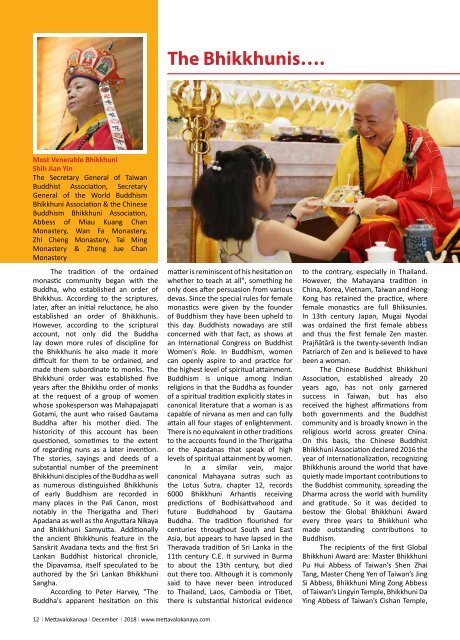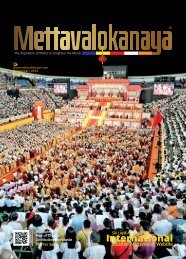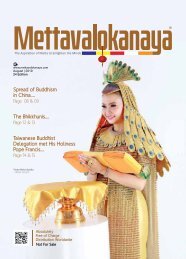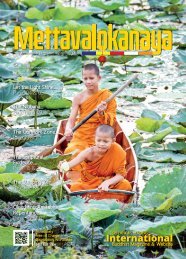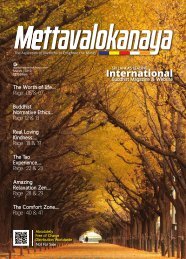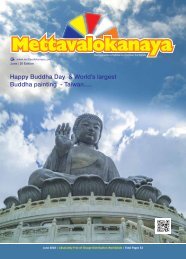Mettavalokanaya_Buddhist_Magazine_December_2018.
“Mettavalokanaya” International Monthly Buddhist Magazine has been successfully distributed to 40 countries including all districts across Sri Lanka and now “Mettavalokanaya” is Sri Lankan Most Popular & Leading monthly Buddhist Magazine.
“Mettavalokanaya” International Monthly Buddhist Magazine has been successfully distributed to 40 countries including all districts across Sri Lanka and now “Mettavalokanaya” is Sri Lankan Most Popular & Leading monthly Buddhist Magazine.
Create successful ePaper yourself
Turn your PDF publications into a flip-book with our unique Google optimized e-Paper software.
The Bhikkhunis….<br />
“Nowadays<br />
Bhikkhunis<br />
are very<br />
powerful in<br />
the World”….<br />
Most Venerable Bhikkhuni<br />
Shih Jian Yin<br />
The Secretary General of Taiwan<br />
<strong>Buddhist</strong> Association, Secretary<br />
General of the World Buddhism<br />
Bhikkhuni Association & the Chinese<br />
Buddhism Bhikkhuni Association,<br />
Abbess of Miau Kuang Chan<br />
Monastery, Wan Fa Monastery,<br />
Zhi Cheng Monastery, Tai Ming<br />
Monastery & Zheng Jue Chan<br />
Monastery<br />
The tradition of the ordained<br />
monastic community began with the<br />
Buddha, who established an order of<br />
Bhikkhus. According to the scriptures,<br />
later, after an initial reluctance, he also<br />
established an order of Bhikkhunis.<br />
However, according to the scriptural<br />
account, not only did the Buddha<br />
lay down more rules of discipline for<br />
the Bhikkhunis he also made it more<br />
difficult for them to be ordained, and<br />
made them subordinate to monks. The<br />
Bhikkhuni order was established five<br />
years after the Bhikkhu order of monks<br />
at the request of a group of women<br />
whose spokesperson was Mahapajapati<br />
Gotami, the aunt who raised Gautama<br />
Buddha after his mother died. The<br />
historicity of this account has been<br />
questioned, sometimes to the extent<br />
of regarding nuns as a later invention.<br />
The stories, sayings and deeds of a<br />
substantial number of the preeminent<br />
Bhikkhuni disciples of the Buddha as well<br />
as numerous distinguished Bhikkhunis<br />
of early Buddhism are recorded in<br />
many places in the Pali Canon, most<br />
notably in the Therigatha and Theri<br />
Apadana as well as the Anguttara Nikaya<br />
and Bhikkhuni Samyutta. Additionally<br />
the ancient Bhikkhunis feature in the<br />
Sanskrit Avadana texts and the first Sri<br />
Lankan <strong>Buddhist</strong> historical chronicle,<br />
the Dipavamsa, itself speculated to be<br />
authored by the Sri Lankan Bhikkhuni<br />
Sangha.<br />
According to Peter Harvey, "The<br />
Buddha's apparent hesitation on this<br />
matter is reminiscent of his hesitation on<br />
whether to teach at all", something he<br />
only does after persuasion from various<br />
devas. Since the special rules for female<br />
monastics were given by the founder<br />
of Buddhism they have been upheld to<br />
this day. <strong>Buddhist</strong>s nowadays are still<br />
concerned with that fact, as shows at<br />
an International Congress on <strong>Buddhist</strong><br />
Women's Role. In Buddhism, women<br />
can openly aspire to and practice for<br />
the highest level of spiritual attainment.<br />
Buddhism is unique among Indian<br />
religions in that the Buddha as founder<br />
of a spiritual tradition explicitly states in<br />
canonical literature that a woman is as<br />
capable of nirvana as men and can fully<br />
attain all four stages of enlightenment.<br />
There is no equivalent in other traditions<br />
to the accounts found in the Therigatha<br />
or the Apadanas that speak of high<br />
levels of spiritual attainment by women.<br />
In a similar vein, major<br />
canonical Mahayana sutras such as<br />
the Lotus Sutra, chapter 12, records<br />
6000 Bhikkhuni Arhantis receiving<br />
predictions of Bodhisattvahood and<br />
future Buddhahood by Gautama<br />
Buddha. The tradition flourished for<br />
centuries throughout South and East<br />
Asia, but appears to have lapsed in the<br />
Theravada tradition of Sri Lanka in the<br />
11th century C.E. It survived in Burma<br />
to about the 13th century, but died<br />
out there too. Although it is commonly<br />
said to have never been introduced<br />
to Thailand, Laos, Cambodia or Tibet,<br />
there is substantial historical evidence<br />
to the contrary, especially in Thailand.<br />
However, the Mahayana tradition in<br />
China, Korea, Vietnam, Taiwan and Hong<br />
Kong has retained the practice, where<br />
female monastics are full Bhiksunies.<br />
In 13th century Japan, Mugai Nyodai<br />
was ordained the first female abbess<br />
and thus the first female Zen master.<br />
Prajñātārā is the twenty-seventh Indian<br />
Patriarch of Zen and is believed to have<br />
been a woman.<br />
The Chinese <strong>Buddhist</strong> Bhikkhuni<br />
Association, established already 20<br />
years ago, has not only garnered<br />
success in Taiwan, but has also<br />
received the highest affirmations from<br />
both governments and the <strong>Buddhist</strong><br />
community and is broadly known in the<br />
religious world across greater China.<br />
On this basis, the Chinese <strong>Buddhist</strong><br />
Bhikkhuni Association declared 2016 the<br />
year of internationalization, recognizing<br />
Bhikkhunis around the world that have<br />
quietly made important contributions to<br />
the <strong>Buddhist</strong> community, spreading the<br />
Dharma across the world with humility<br />
and gratitude. So it was decided to<br />
bestow the Global Bhikkhuni Award<br />
every three years to Bhikkhuni who<br />
made outstanding contributions to<br />
Buddhism.<br />
The recipients of the first Global<br />
Bhikkhuni Award are: Master Bhikkhuni<br />
Pu Hui Abbess of Taiwan’s Shen Zhai<br />
Tang, Master Cheng Yen of Taiwan’s Jing<br />
Si Abbess, Bhikkhuni Ming Zong Abbess<br />
of Taiwan’s Lingyin Temple, Bhikkhuni Da<br />
Ying Abbess of Taiwan’s Cishan Temple,<br />
Bhikkhuni Hong An Abbess of Taiwan’s<br />
Miao-Chiung Temple, Bhikkhuni Xiao<br />
Jing Chair of Korea’s Eleventh Qing Lin<br />
Council, Bhikkhuni Siou Neng Abbess of<br />
Taiwan’s Ling Shan Temple, Bhikkhuni<br />
Thubten Chodron Abbess of Sravasti<br />
Abbey in the US, Bhikkhuni He Jing<br />
Abbess of Korea’s Mingfa Temple and<br />
Bhikkhuni Xiu Xun Abbess of Taiwan’s<br />
Jinshan Temple. Bhikkhuni Shao Hong<br />
Abbess of Taiwan's Haishan Temple,<br />
Bhikkhuni Sudarshana of Sri Lanka<br />
Abbess of Samadhi <strong>Buddhist</strong> Meditation<br />
Center in the USA, Bhikkhuni Guang<br />
Zong Abbess of Taiwan's Gushan Temple,<br />
Bhikkhuni Liu Wen Abbess of Korea’s<br />
Baekheung-am Hermitage of Eunhaesa<br />
Temple, Bhikkhuni Wu Yin Dean of<br />
Taiwan’s Luminary <strong>Buddhist</strong> Institute,<br />
Bhikkhuni Jue Hua Chairperson of the<br />
Tainan <strong>Buddhist</strong> Association, Bhikkhuni<br />
Ru Yi Dean of China's Sichuan Bhikkhuni<br />
<strong>Buddhist</strong> Institute, Bhikkhuni Zhen Yu<br />
Abbess of Taiwan's Taichung <strong>Buddhist</strong><br />
Assembly Hall, Bhikkhuni Rattanavali<br />
Chairperson of Thailand's International<br />
Women’s Meditation Centre and<br />
Bhikkhuni Hui Zhuang Admiistrator of<br />
Taiwan's Mingshan Temple.Bhikkhuni<br />
Dr. Zhiru Professor of Religious Studies at<br />
California's Pomona College, Bhikkhuni<br />
Jing Ding Abbess of Taiwan's Yuanzhao<br />
Temple, Bhikkhuni Dr.Kuang Seng Head<br />
of Thailand's Kuan - In Bodhisattava’s<br />
Hall, Bhikkhuni Dr. Pannavati Abbess<br />
of Embracing Simplicity Hermitage in<br />
the US, Bhikkhuni Xiu Zhang Abbess of<br />
Taiwan's Xinglong Temple, Bhikkhuni<br />
Xing Yi Abbess of South Korea's<br />
Shinheungsa Temple, Bhikkhuni Xiu Jing<br />
Abbess of Taiwan's Lingshan Temple,<br />
Bhikkhuni Dun Yan Supervisor of China's<br />
Taishan Temple and Bhikkhuni Zhi Shan<br />
Abbess of Taiwan's Ciyin Abode.<br />
Bhikkhuni Kammatthana Abbess<br />
of Cambodia's Maha Panna Vihara,<br />
Bhikkhuni Shang Ding Abbess of<br />
Taiwan's Miao Jue Temple, Bhikkhuni<br />
Pema Chodron Abbess of Gampo<br />
Abbey in the US, Bhikkhuni Ru Dao<br />
Chairwoman of Hai Ming Temple in the<br />
US, Bhikkhuni Ru Jun Abbess of Taiwan's<br />
Fuzhi Temple, Anandabodhi Bhikkhuni<br />
Abbess of Aloka Vihara in the US,<br />
Bhikkhuni Che Zong Abbess of Taiwan's<br />
Xinche Chan Temple, Bhikkhuni Sing Kan<br />
Abbess of Malaysia's Sam Poh Thong<br />
<strong>Buddhist</strong> Temple, Bhikkhuni Chang<br />
Deng Abbess of Taiwan's Zhengzing<br />
Chan Temple, Bhikkhuni Zi De Abbess<br />
of Taiwan's Bao Shan Chan Temple,<br />
Bhikkhuni Ji Zun Abbess of Malaysia's<br />
Hui Lin Yuan, Bhikkhuni Jing Zhi Abbess<br />
of Taiwan's Ciyuan Chan Temple,<br />
Bhikkhuni Santacitta Abbess of Aloka<br />
Vihara in the US, Bhikkhuni Fa Zhao<br />
Abbess of Taiwan's Xiangyun Temple,<br />
Bhikkhuni Chang Lu Abbess of Taiwan's<br />
Tzu-Lung Temple, Bhikkhuni Hong Yuan<br />
Abbess of China's Guanyin Chan Temple,<br />
Bhikkhuni Wu Ren Director of Taiwan's<br />
Ching Jou Orphanage, Bhikkhuni Xian<br />
Du President of Taiwan's Huayen Lotus<br />
Association, Bhikkhuni Xiu Yi Abbess<br />
of Taiwan's Miao Quan Temple and<br />
Bhikkhuni Ming Yu Abbess of Taiwan's<br />
Fuen Lotus Association.<br />
With the trend toward<br />
globalization, Buddhism must diversify in<br />
the future to remain connected with the<br />
world and attract people from different<br />
walks of life to accept Buddhism and<br />
to progress from their initial faith to<br />
gradually becoming devoted followers<br />
of Buddhism. For this reason the<br />
Association decided to confer this award<br />
to recognize Bhikkhunis who have made<br />
outstanding contributions in the areas<br />
of education, academics, arts, charity,<br />
medicine, etc. Regardless of nationality<br />
or denomination, let the quiet and hardworking<br />
receive recognition for their<br />
work so their courage may continue to<br />
soar without bounds, drawing others to<br />
practice the Buddha dharma. This is the<br />
goal of awarding this honor. The World<br />
<strong>Buddhist</strong> Bhikkhuni Association was<br />
established on November 22, 2016 by<br />
first forming an organization in Taiwan.<br />
With nearly 100 Bhikkhunis from around<br />
the world signing a memorandum<br />
of understanding regarding the<br />
association’s establishment, this<br />
undertaking was not only a major<br />
event in the <strong>Buddhist</strong> world; it was an<br />
unprecedented event in the Bhikkhuni<br />
community.<br />
During the meeting, Bhikkhuni<br />
Ru Yi, Dean of the Sichuan Bhikkhuni<br />
<strong>Buddhist</strong> Institute in China, nominated<br />
the highly respected Venerable Pu Hui,<br />
Chairwoman of the Chinese <strong>Buddhist</strong><br />
Bhikkhuni Association, to be the<br />
first president of the World <strong>Buddhist</strong><br />
Bhikkhuni Association, which was<br />
unanimously endorsed by masters from<br />
many countries and passed with the<br />
applause of all the masters in attendance,<br />
a moment that could be described as<br />
the light of Taiwan. Venerable Pu Hui<br />
stated that because of the fateful event<br />
of the 1st Global Bhikkhuni Awards of<br />
outstanding Ceremony organized by the<br />
Chinese <strong>Buddhist</strong> Bhikkuni Association,<br />
Bhikkhunis from twelve countries<br />
around the world had experienced the<br />
rare opportunity of gathering together in<br />
one place. Each of the award recipients,<br />
Dharma masters distinguished as valuing<br />
both doctrine and application and as<br />
great Bhikkhunis for their sacrifices and<br />
contributions to Dharma work, formed a<br />
global organization to unite Bhikkhunis<br />
from around the world into a collective<br />
force. It was an important cause for<br />
cooperation that required no hesitation.<br />
Hence, the main work of the<br />
World <strong>Buddhist</strong> Bhikkhuni Association in<br />
the future is to take active measures to<br />
invite Bhikkhuni groups or monasteries<br />
like WBBA or that have plans with<br />
similar missions as the WBBA from every<br />
country around the world to join us in<br />
perpetuating the wisdom of the Buddha<br />
and spreading the Dharma to all parts<br />
of the world. The future purpose of the<br />
World <strong>Buddhist</strong> Bhikkhuni Association<br />
is to unite global <strong>Buddhist</strong> Bhikkhunis,<br />
promote the Dharma, protect the Triple<br />
Gem, purify people's minds through the<br />
Dharma, carry out charitable works,<br />
<strong>Buddhist</strong> culture and educational<br />
activities to benefit the whole world.<br />
The headquarters and the main office<br />
will be located in Taiwan.<br />
12 l <strong>Mettavalokanaya</strong> l <strong>December</strong> l 2018 l www.mettavalokanaya.com www.mettavalokanaya.com l 2018 l <strong>December</strong> l <strong>Mettavalokanaya</strong> l 13


